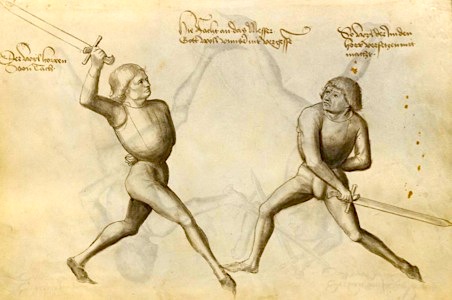For lack of any other fodder for blogging, I'd like to respond at length to an inquiry made post-session by the player in control of the party's Sami pagan priest of lightning. He asked if his having revealed the source of his power, particularly in calling down lightning to incinerate a bear, wouldn't place any strain on relations with those members of the party whose powers come from the Christian God. My short answer was that that would be a dilemma for them to ponder. My slightly longer answer is to give them some fodder for pondering in this connection.
The party's paladin, who happens also to be female, is played by a male, who also happens to be an athiest. It's a challenge of a rather high to the imagination to put oneself in the character of such an opposite. It's not prohibitively difficult to put oneself into a character very unlike oneself, of course; I generally relish playing an ESTP, and I think I do it quite well, despite actually being an INTJ. I think, however, that if I had convincing and incontrovertible evidence for the existence of any deity, my view of the world would be radically different. It would be all the more so if I had a female body and brain whose thoughts were at least to some degree influenced by a greater presence of female hormones and other biochemical differences. Personally, I don't believe I could conceive of the resulting worldview sufficiently to pour myself into the portrayal of such a character.
It has to be done, however, in order to formulate the appropriate response to the presence of a heretic within the paladin's close acquaintance. The heathen exposed himself as a heathen in the process of squashing a threat to the lives of everyone in the party. The paladin will have to find her own answer as to whether she should continue to associate with the pagan lightning-worshipper, or perhaps flee from him and beg the Lord's forgiveness for having ever associated with him at all. Is keeping company with the likes of him actually contrary to the will of God, or merely contrary to the manner in which the majority interpret that will? Can a heretic be a temporary ally in the battle against evil, leaving the final judgement to the Lord Himself? Or is it a Christian's duty to turn the Sami pagan away from his heathen ways, even if it means losing a great source of power? These are questions with which the paladin will have to grapple. It's hardly as clear an issue as, say, breaking any of the Ten Commandments. If she cannot find the correct answer--or worse, if she willfully avoids contemplating the question--the Lord's will is likely to present itself, eventually, in ways she won't like at all.
One of the most powerful tools at the paladin's disposal is that bit of woowoo called detect evil. Up to now, it has been interpreted as a kind of 'detection of malicious intent', but this is an oversimplification. It also involves a sensitivity to auras that exude malevolence regardless of any specific intention. Thus, when our paladin encountered a demon in the last session, her powers of detection hit the proverbial jackpot. Demons are by definition evil. Registering the demon as malevolent, in this case, had no connection whatever to any desire to harm the party. As it happened, she had no such desire. This, however, does not necessarily mean she would have had any compunctions about destroying the party if it served her purposes--or, indeed, on a whim for reasons that would have seemed to the party absolutely arbitrary.
It should be evident at once that demons have a very different code of ethics from that of humans. That they inhabit a very different reality was merely touched by an exchange this demon had with the lightning priest. He asked if she was going to find a portal to get back to her own dimension. She answered, 'You're picturing something like a door or a window. But it isn't like that. It isn't like anything you know.'
The demon was a supernatural entity acting from her own innate nature, which registers as something closer to pure evil than anything the paladin had ever encountered before. What would her detection and interpretation be of a mere human who chooses to turn his back on the Lord and has in plain view flouted five of the Ten Commandments himself thus far?
